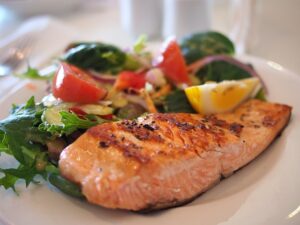Introduction
Getting enough protein in your diet is essential for maintaining good health and supporting various bodily functions. The recommended daily intake of protein for an average adult is around 50 grams, but if you are looking to increase your protein intake, aiming for 80 grams a day can be a good target. In this article, we will explore different ways to get 80 grams of protein a day and provide you with practical tips to achieve this goal.
Choosing Protein-Rich Foods
Lean meats and poultry: Incorporating lean meats and poultry into your diet is an excellent way to boost your protein intake. Skinless chicken breast, turkey, and lean cuts of beef are all great options. A 3-ounce serving of cooked chicken breast provides approximately 26 grams of protein.
Fish and seafood: Fish and seafood are not only rich in protein but also contain essential omega-3 fatty acids. Salmon, tuna, and shrimp are particularly high in protein. A 3-ounce serving of cooked salmon contains around 22 grams of protein.
Eggs: Eggs are a versatile and affordable source of protein. One large egg contains about 6 grams of protein. Incorporating eggs into your breakfast or using them in various recipes can help increase your protein intake.
Dairy products: Dairy products such as milk, yogurt, and cheese are excellent sources of protein. Greek yogurt, in particular, is known for its high protein content. A cup of Greek yogurt can provide around 20 grams of protein.
Plant-based protein sources: If you follow a vegetarian or vegan diet, there are plenty of plant-based protein sources available. Legumes like lentils, chickpeas, and black beans are packed with protein. Additionally, tofu, tempeh, and edamame are great options. A cup of cooked lentils contains approximately 18 grams of protein.
Supplementing with Protein Powders
Whey protein: Whey protein is a popular and easily digestible protein supplement. It is derived from milk and contains all the essential amino acids. Adding a scoop of whey protein powder to your smoothies or shakes can significantly increase your protein intake. One scoop of whey protein powder typically provides around 20 grams of protein.
Plant-based protein powders: For those following a vegetarian or vegan diet, plant-based protein powders are a great alternative. They are typically made from sources like peas, brown rice, or hemp. These powders can be mixed with water, milk, or added to recipes to boost protein content.
Meal Planning and Snacking
Spread protein intake throughout the day: Instead of trying to consume all 80 grams of protein in one or two meals, aim to distribute it evenly throughout the day. This approach allows for better absorption and utilization of protein by the body.
Include protein in every meal: Make sure to include a protein source in each meal. This could be lean meat, fish, eggs, dairy products, or plant-based alternatives. Adding protein-rich foods to your meals will help you reach your daily target.
Snack on protein-rich foods: Incorporate protein-rich snacks into your daily routine. Greek yogurt, cottage cheese, protein bars, and nuts are all convenient options that can help you meet your protein goals.
Conclusion
Achieving a daily protein intake of 80 grams is attainable with careful planning and the inclusion of protein-rich foods in your diet. By incorporating lean meats, fish, eggs, dairy products, plant-based protein sources, and protein powders, you can easily meet your protein requirements. Remember to distribute your protein intake throughout the day and include protein in every meal. With these strategies, you can ensure that you are getting the necessary protein to support your overall health and well-being.
References
– Mayo Clinic: www.mayoclinic.org
– Healthline: www.healthline.com
– National Institutes of Health: www.nih.gov












